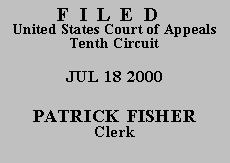

| UNITED STATES OF AMERICAN, |
|
| v. | |
| RANDA FAY GARNER, |
Randa Fay Garner pleaded guilty to one count of forging endorsements on Treasury checks of the United States, a violation of 18 U.S.C. § 510(a)(2)(C). Ms. Garner was sentenced to 60 months' probation with home confinement of 180 days with electronic monitoring. This sentence incorporated a two-point enhancement for more than minimal planning. Ms. Garner was also ordered to pay $32,219.00 in restitution to the Social Security Administration. Ms. Garner appeals the enhancement and the restitution order.
I. DISCUSSION
A. Enhancement for more than minimal planning.
Ms. Garner contends the district court erred in enhancing her base offense level by two levels for "more than minimal planning" pursuant to USSG §2F1.1(b)(2)(A). "[M]ore than minimal planning" is deemed to exist "in any case involving repeated acts over a period of time, unless it is clear that each instance was purely opportune." USSG §1B1.1 comment. n.1(f); United States v. Ensminger, 174 F.3d 1143, 1147 (10th Cir. 1999). The question of whether an offense involved "more than minimal planning" is a factual determination we review for clear error. See United States v. Orr, 68 F.3d 1247, 1253 (10th Cir. 1995).
Based upon the evidence in the record, we conclude the district court did not commit clear error in finding the charged offenses involved more than
minimal planning. Ms. Garner lived in St. George, Utah. From 1994 to 1998, on a monthly basis, Ms. Garner obtained more than fifty checks payable to her deceased father at a P.O. Box in LaVerkin, Utah. She endorsed each check, sometimes using her own name, but more frequently forging her father's signature. She traveled to Washington, Utah to deposit each check. Ms. Garner's criminal conduct, considered as a whole, involved a series of repeated acts of forgery over a period of four years. The record sufficiently supports the court's finding that her actions constituted "more than minimal planning" for purposes of §2F1.1(b)(2)(A). See United States v. Hill, 197 F.3d 436, 445-46 (10th Cir. 1999). Accordingly, the court did not err in applying the enhancement.
B. Ex Post Facto Claim
Ms. Garner also contends on appeal that the district court violated her ex post facto rights by relying on the Mandatory Victim's Restitution Act. As she recognizes, however, this argument is foreclosed by our opinion in United States v. Nichols, 169 F.3d 1255,1279-80 (10th Cir.), cert. denied, 120 S. Ct. 336 (1999), and we will therefore not consider it further.
II. CONCLUSION
For the reasons set forth above, we AFFIRM the judgment of the district court.
Entered for the Court,
Robert H. Henry
Circuit Judge
*. This order and judgment is not binding precedent, except under the doctrines of law of the case, res judicata, and collateral estoppel. The court generally disfavors the citation of orders and judgments; nevertheless, an order and judgment may be cited under the terms and conditions of 10th Cir. R. 36.3.
**. After examining the briefs and appellate record, this panel has determined unanimously to honor the parties' request for decision on the briefs without oral argument. See Fed. R. App. P. 34(f). The case is therefore submitted without oral argument.